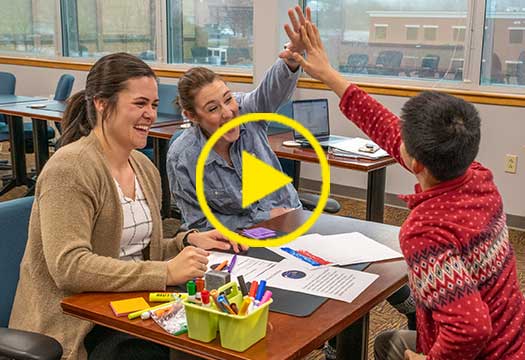M.Ed. In Literacy and Reading Specialist Certification
Overview
Welcome to our combined (1) M.Ed. in Literacy and (2) PA Reading Specialist K-12 certification program! This 36-credit program grants a master’s degree and fulfills all PDE requirements in order for candidates to apply for their PA Reading Specialist Certification for grades K–12.
Many of our M.Ed. Literacy program graduates take jobs as building reading specialists, literacy coaches, Title 1 teachers, and child study team leaders/coordinators in elementary, middle, and high school settings. Many others continue as classroom teachers in their current settings, but with an improved knowledge base and expertise to better serve the needs of their students and communities.
Program Mission
Our M.Ed. program mission is to educate preservice and professional teachers to be lifelong learners who develop expert knowledge of language and literacy development and literacy instruction and assessment. Our students will become influential teachers who are leaders and advocates for social justice in their communities.
Student Learning Outcomes
- Candidates demonstrate knowledge of major theoretical, conceptual, historical, and evidence-based foundations of literacy and language, the ways in which they interrelate, and the role of the reading/literacy specialist in schools.
- Candidates use foundational knowledge to design literacy curricula to meet needs of learners, especially those who experience difficulty with literacy; design, implement, and evaluate small- group and individual evidence-based literacy instruction for learners; collaborate with teachers to implement effective literacy practices.
- Candidates understand, select, and use valid, reliable, fair, and appropriate assessment tools to screen, diagnose, and measure student literacy achievement; inform instruction and evaluate interventions; assist teachers in their understanding and use of assessment results; advocate for appropriate literacy practices to relevant stakeholders.
- Candidates demonstrate knowledge of research, relevant theories, pedagogies, and essential concepts of diversity and equity; demonstrate an understanding of themselves and others as cultural beings; create classrooms and schools that are inclusive and affirming; advocate for equity at school, district, and community levels.
- Candidates meet the developmental needs of all learners and collaborate with school personnel to use a variety of print and digital materials to engage and motivate all learners; integrate digital technologies in appropriate, safe, and effective ways; foster a positive climate that supports a literacy-rich learning environment.
- Candidates demonstrate the ability to be reflective literacy professionals, who apply their knowledge of adult learning to work collaboratively with colleagues; demonstrate their leadership and facilitation skills; advocate on behalf of teachers, students, families, and communities.
- Candidates complete supervised, integrated, extended practica/clinical experiences that include intervention work with students and working with their peers and experienced colleagues; practica include ongoing experiences in school-based setting(s); supervision includes observation and ongoing feedback by qualified supervisors.
Career Prospects
In light of recent alarming statistic such as the three-point decline in fourth and eight grader reading scores leaving students approximately four months behind in reading (NAEP, 2022), the demand for skilled reading specialists in America has never been more urgent. However, the shortage of reading specialists in certain states, like West Virginia and New Hampshire (DOE, 2023), underscores the critical need for professionals to receive training in this field. By pursuing a career as a reading specialist, you can fulfill the following roles and make a profound impact on the educational landscape of your community:
- Reading specialist positions in a K-12 public/private school setting.
- Classroom teacher in a K-12 public/private school setting.
- Literacy coach in a K-12 public/private school setting.
- Doctoral candidate.
- Leadership position in Reading/Language Arts.
- University level teaching instructors.
- School administrator.
Highlights of Curriculum
- Nationally recognized faculty – all experienced classroom teachers and/or reading specialists/literacy coaches
- International Literacy Association Accredited and International Dyslexia Association - informed program standards
- Coursework that targets the science of reading and structured literacy
- A dedicated diversity course coupled with a strong program strand that focuses on culturally relevant pedagogy, equity, inclusion, and social justice
- Coursework that includes the what, why, and how of assessing and teaching phonemic awareness, phonics, fluency, vocabulary, comprehension, and writing.
- Evening and summer classes and flexible individual schedules to meet each candidate’s needs as a full-time working professional educator
- A blend of both face-to-face and online coursework
Practicum Field Experience at the WCU Reading Center
An essential part of our M.Ed. program includes two closely supervised practicum experiences housed in our newly designed WCU Reading Center. During these practica (which occur after school during normal graduate class times or during the summer mornings), you will work directly with children and adolescent students who struggle with a variety of literacy skills. You will learn the nuts and bolts of what reading specialists do every day, including:
- Administering and analyzing data from a variety of literacy assessments
- Designing a research-based intervention plan
- Tutoring a student who struggles with literacy skills for an entire semester, with valuable and consistent feedback from your supervisor after each observation
- Conducting progress monitoring and post-assessments
- Writing a final case report for the student’s parents/guardians (and often school), and
- Conducting an exit interview with the student’s parents/guardians.

Watch the WCU Reading Center in action!
Admissions Requirements & Application Process
Admissions Requirements
- Two letters of professional recommendation (e.g., supervisors, professors, employers, colleagues)
- All official transcripts (both undergraduate and, if appropriate, graduate). WCU transcripts are housed at WCU, so they do not need to be sent.
- Professional statement of purpose
- Initial teacher certification (e.g., PA teaching certification)
Application Process
- Apply here to The Graduate School.
- Once all materials are received, admission decisions are normally made within 1-2 weeks.
Transfer Student Information
We welcome transfer students! If you have another masters or previous graduate coursework, we can potentially transfer in up to 30% of the credits from another institution; however, this coursework must be identified as equivalent by the Literacy Dept. when we complete a transcript analysis upon matriculation into our program.
Clearance Information
Students must obtain clearances for each course containing field experience in accordance with Pennsylvania statutes. These include:
- Pennsylvania Criminal Record Checks
- FBI fingerprinting
- Pennsylvania Child Abuse Record checks - required for all who enter a school.
- TB Test
View More Clearance Information for specific details about your program.
All clearances must be completed prior to the first day of the field course in which you are enrolled and updated every year. Please contact the Office of Candidate Services at 610-436-2999. Some school districts hosting early field students and student teachers require a TB test issued within the year they begin their school district assignment.
NOTE: School district requirements take precedence over university policy. Failure to maintain a current set of clearances will prevent you from enrollment and/or may require your dismissal from field-based courses, blocked classes, and student teaching.
Degree Candidacy Requirements
- Students must apply for degree candidacy after the completion of 15 credits
- Courses required within the pre-candidacy period include EDR 505, 507, 509, 519 and one additional course from the prescribed program.
- Students must maintain an overall GPA of 3.0 during the pre-candidacy period.
Degree Completion Requirements
In addition to meeting degree requirements of the University, the candidate must:
- Successfully complete 30 credits in literacy and six additional credits in professional education (electives).
- Workshops will not be accepted to satisfy this requirement. Candidates must refer to their individual advising sheets for the specific course requirements.
- Achieve an overall GPA of at least 3.0.
- The student must successfully submit a theoretical foundations portfolio (see below for additional information).
- Students must attempt the Reading Specialist Praxis Exam.
- Students are responsible for meeting all requirements within the specified time.
Theoretical Foundations Portfolio Policy
Students are required to complete a Theoretical Foundations portfolio as part of their successful completion of the degree program (see degree completion requirements above).
Portfolio Details
Students are eligible to submit their Theoretical Foundations Portfolio after they have completed EDR 505, EDR 507, EDR 509, EDR 516, EDR 519, and either EDR 512 or EDR 532 and after they have attended a portfolio work session. Portfolio submissions are due on the 3rd Monday in October, or the 4th Monday in February, or the 3rd Monday in August. Candidates whose portfolios receive a failing evaluation are permitted one re-submission within a two-year period. Candidates whose re-submitted portfolios receive a failing evaluation are dropped from the degree program.
PA Reading Specialist K-12 Certification Requirements
In addition to (1) successfully completing our PDE accredited M.Ed. in Literacy program (see degree completion requirements above), candidates must also (2) pass the Reading Specialist Praxis exam before they can apply to PDE for a PA Reading Specialist Certification, K-12. For specific information on which test to take and how to apply to PDE, see the WCU College of Education links for the following:
Socially Just Futures Literacy Department Scholarship
Requirements
Recipient Requirements:
- Be a current applicant or a current candidate in the M.Ed. in Literacy Program
- Exhibit excellent potential and performance
- Demonstrate commitment to inclusive and socially just teaching
- Minimum overall GPA of 3.0
- Be a student of color/ underrepresented minority
Application Materials:
- Applicants must submit:
- A cover letter that addresses:
- How do you demonstrate a commitment to inclusive and socially justice teaching?
- A copy of their most recent transcript
- A cover letter that addresses:
Timeline:
-
Candidates who meet the above requirements and wish to apply for the scholarship will be asked to supply the Scholarship Committee with all application materials by May 1 in order to be considered.
Applications will open here on March 24.
Applications will close on May 1.
The committee will notify recipients by June 1.
Award:
- The scholarship for current applicants is pending acceptance to the WCU M.Ed. in Literacy Program and is to be awarded at the discretion of the scholarship committee.
- The recipient will receive a total of $2400 to be applied towards tuition. The scholarship will be distributed across three semesters of the recipient’s choosing ($800 per semester) pending the student maintains an average 3.0 GPA.

Contact Information
Kevin Flanigan | KFlanigan@wcupa.edu | 610-430-5642
